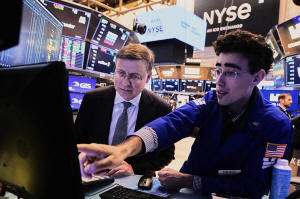US consumer confidence plummets to Covid-era low as trade war stokes
anxiety
[April 30, 2025] By
CHRISTOPHER RUGABER
WASHINGTON (AP) — Americans' confidence in the economy slumped for the
fifth straight month to the lowest level since the onset of the COVID-19
pandemic as anxiety over the impact of tariffs takes a heavy toll.
The Conference Board said Tuesday that its consumer confidence index
fell 7.9 points in April to 86, its lowest reading since May 2020.
Nearly one-third of consumers expect hiring to slow in the coming
months, nearly matching the level reached in April 2009, when the
economy was mired in the Great Recession.
The figures reflect a rapidly souring mood among Americans, most of whom
expect prices to rise because of the widespread tariffs imposed by
President Donald Trump. About half of Americans are also worried about
the potential for a recession, according to a survey by The Associated
Press-NORC Center.
“Rattled consumers spend less than confident consumers," said Carl
Weinberg, chief economist at High Frequency Economics, in an email. “If
confidence sags and consumers retrench, growth will go down.”
A measure of Americans’ short-term expectations for their income,
business conditions and the job market plunged 12.5 points to 54.4, the
lowest level in more than 13 years. The reading is well below 80, which
typically signals a recession ahead.

How this gloomy mood translates into spending, hiring, and growth will
become clearer in the coming days and weeks. On Wednesday, the
government will report on U.S. economic growth during the first three
months of the year, and economists are expecting a sharp slowdown as
Americans pulled back on spending after a strong winter holiday shopping
season.
And on Friday the Labor Department will release its latest report on
hiring and the unemployment rate. Overall, economists expect it should
still show steady job gains, though some forecast it could report
sharply reduced hiring.
[to top of second column] |

Valdis Dombrovskis, left, Executive Vice President of the European
Commission for Economy and Productivity, meets with Specialist
Alexander Weitzman on the floor of the New York Stock Exchange,
Monday, April 28, 2025. (AP Photo/Richard Drew)
 The stark decline in consumer
confidence also likely reflected the sharp swings in stock and bond
prices that roiled financial markets earlier this month. While all
age groups and most income brackets reported lower confidence, the
decline was steepest among households earning more than $125,000 and
among consumers 35 to 55 years old.
Though major U.S. markets rebounded over the past week, the S&P 500
is still down 6% for the year and the Dow Jones has lost 5%. The
growth-heavy Nasdaq is down 10% in 2025.
The Conference Board said that mentions of tariffs in write-in
responses reached an all-time high this month, with the duties on
the top of consumers' minds. Trump has imposed a tariff of 10% on
nearly all imports, as well as a huge 145% tariff on most goods from
China. He has imposed separate import taxes on steel, aluminum, and
cars.
More Americans are also now worried that the economy could tip into
a recession, with the proportion of consumers expecting a downturn
in the next 12 months reaching a two-year high.
Fewer consumers said they were planning to buy a home or car in the
next six months. Sales of previously occupied U.S. homes slowed last
month in a lackluster start to the spring homebuying season as
elevated mortgage rates and rising prices discouraged those looking.
And Americans also said they would spend less on services. The
proportion of Americans planning an overseas vacation in the next
six months fell to 16.4%, down from 24.1% in December. And the
proportion of consumers planning to spend more on dining out
plummeted by nearly the most on record in April, the Conference
Board said.
All contents © copyright 2025 Associated Press. All rights reserved |